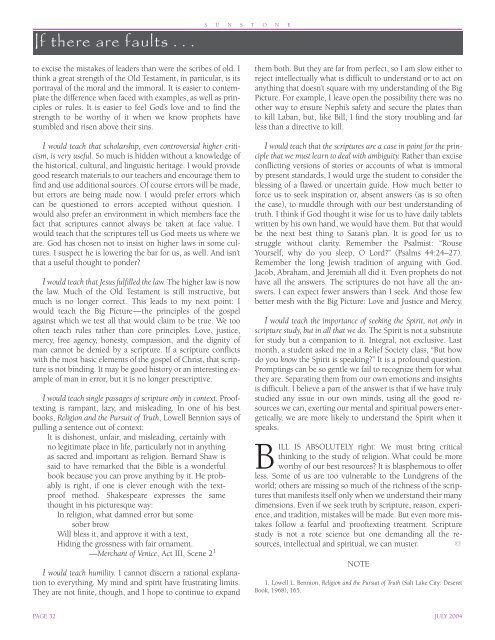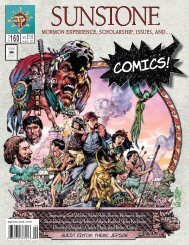is there a place for heavenly mother in mormon theology?
is there a place for heavenly mother in mormon theology?
is there a place for heavenly mother in mormon theology?
Create successful ePaper yourself
Turn your PDF publications into a flip-book with our unique Google optimized e-Paper software.
If <strong>there</strong> are faults . . .<br />
S U N S T O N E<br />
to exc<strong>is</strong>e the m<strong>is</strong>takes of leaders than were the scribes of old. I<br />
th<strong>in</strong>k a great strength of the Old Testament, <strong>in</strong> particular, <strong>is</strong> its<br />
portrayal of the moral and the immoral. It <strong>is</strong> easier to contemplate<br />
the difference when faced with examples, as well as pr<strong>in</strong>ciples<br />
or rules. It <strong>is</strong> easier to feel God’s love and to f<strong>in</strong>d the<br />
strength to be worthy of it when we know prophets have<br />
stumbled and r<strong>is</strong>en above their s<strong>in</strong>s.<br />
I would teach that scholarship, even controversial higher critic<strong>is</strong>m,<br />
<strong>is</strong> very useful. So much <strong>is</strong> hidden without a knowledge of<br />
the h<strong>is</strong>torical, cultural, and l<strong>in</strong>gu<strong>is</strong>tic heritage. I would provide<br />
good research materials to our teachers and encourage them to<br />
f<strong>in</strong>d and use additional sources. Of course errors will be made,<br />
but errors are be<strong>in</strong>g made now. I would prefer errors which<br />
can be questioned to errors accepted without question. I<br />
would also prefer an environment <strong>in</strong> which members face the<br />
fact that scriptures cannot always be taken at face value. I<br />
would teach that the scriptures tell us God meets us where we<br />
are. God has chosen not to <strong>in</strong>s<strong>is</strong>t on higher laws <strong>in</strong> some cultures.<br />
I suspect he <strong>is</strong> lower<strong>in</strong>g the bar <strong>for</strong> us, as well. And <strong>is</strong>n’t<br />
that a useful thought to ponder?<br />
I would teach that Jesus fulfilled the law. The higher law <strong>is</strong> now<br />
the law. Much of the Old Testament <strong>is</strong> still <strong>in</strong>structive, but<br />
much <strong>is</strong> no longer correct. Th<strong>is</strong> leads to my next po<strong>in</strong>t: I<br />
would teach the Big Picture—the pr<strong>in</strong>ciples of the gospel<br />
aga<strong>in</strong>st which we test all that would claim to be true. We too<br />
often teach rules rather than core pr<strong>in</strong>ciples. Love, justice,<br />
mercy, free agency, honesty, compassion, and the dignity of<br />
man cannot be denied by a scripture. If a scripture conflicts<br />
with the most basic elements of the gospel of Chr<strong>is</strong>t, that scripture<br />
<strong>is</strong> not b<strong>in</strong>d<strong>in</strong>g. It may be good h<strong>is</strong>tory or an <strong>in</strong>terest<strong>in</strong>g example<br />
of man <strong>in</strong> error, but it <strong>is</strong> no longer prescriptive.<br />
I would teach s<strong>in</strong>gle passages of scripture only <strong>in</strong> context. Prooftext<strong>in</strong>g<br />
<strong>is</strong> rampant, lazy, and m<strong>is</strong>lead<strong>in</strong>g. In one of h<strong>is</strong> best<br />
books, Religion and the Pursuit of Truth, Lowell Bennion says of<br />
pull<strong>in</strong>g a sentence out of context:<br />
It <strong>is</strong> d<strong>is</strong>honest, unfair, and m<strong>is</strong>lead<strong>in</strong>g, certa<strong>in</strong>ly with<br />
no legitimate <strong>place</strong> <strong>in</strong> life, particularly not <strong>in</strong> anyth<strong>in</strong>g<br />
as sacred and important as religion. Bernard Shaw <strong>is</strong><br />
said to have remarked that the Bible <strong>is</strong> a wonderful<br />
book because you can prove anyth<strong>in</strong>g by it. He probably<br />
<strong>is</strong> right, if one <strong>is</strong> clever enough with the textproof<br />
method. Shakespeare expresses the same<br />
thought <strong>in</strong> h<strong>is</strong> picturesque way:<br />
In religion, what damned error but some<br />
sober brow<br />
Will bless it, and approve it with a text,<br />
Hid<strong>in</strong>g the grossness with fair ornament.<br />
—Merchant of Venice, Act III, Scene 2 1<br />
I would teach humility. I cannot d<strong>is</strong>cern a rational explanation<br />
to everyth<strong>in</strong>g. My m<strong>in</strong>d and spirit have frustrat<strong>in</strong>g limits.<br />
They are not f<strong>in</strong>ite, though, and I hope to cont<strong>in</strong>ue to expand<br />
them both. But they are far from perfect, so I am slow either to<br />
reject <strong>in</strong>tellectually what <strong>is</strong> difficult to understand or to act on<br />
anyth<strong>in</strong>g that doesn’t square with my understand<strong>in</strong>g of the Big<br />
Picture. For example, I leave open the possibility <strong>there</strong> was no<br />
other way to ensure Nephi’s safety and secure the plates than<br />
to kill Laban, but, like Bill, I f<strong>in</strong>d the story troubl<strong>in</strong>g and far<br />
less than a directive to kill.<br />
I would teach that the scriptures are a case <strong>in</strong> po<strong>in</strong>t <strong>for</strong> the pr<strong>in</strong>ciple<br />
that we must learn to deal with ambiguity. Rather than exc<strong>is</strong>e<br />
conflict<strong>in</strong>g versions of stories or accounts of what <strong>is</strong> immoral<br />
by present standards, I would urge the student to consider the<br />
bless<strong>in</strong>g of a flawed or uncerta<strong>in</strong> guide. How much better to<br />
<strong>for</strong>ce us to seek <strong>in</strong>spiration or, absent answers (as <strong>is</strong> so often<br />
the case), to muddle through with our best understand<strong>in</strong>g of<br />
truth. I th<strong>in</strong>k if God thought it w<strong>is</strong>e <strong>for</strong> us to have daily tablets<br />
written by h<strong>is</strong> own hand, we would have them. But that would<br />
be the next best th<strong>in</strong>g to Satan’s plan. It <strong>is</strong> good <strong>for</strong> us to<br />
struggle without clarity. Remember the Psalm<strong>is</strong>t: “Rouse<br />
Yourself, why do you sleep, O Lord?” (Psalms 44:24–27).<br />
Remember the long Jew<strong>is</strong>h tradition of argu<strong>in</strong>g with God.<br />
Jacob, Abraham, and Jeremiah all did it. Even prophets do not<br />
have all the answers. The scriptures do not have all the answers.<br />
I can expect fewer answers than I seek. And those few<br />
better mesh with the Big Picture: Love and Justice and Mercy.<br />
I would teach the importance of seek<strong>in</strong>g the Spirit, not only <strong>in</strong><br />
scripture study, but <strong>in</strong> all that we do. The Spirit <strong>is</strong> not a substitute<br />
<strong>for</strong> study but a companion to it. Integral, not exclusive. Last<br />
month, a student asked me <strong>in</strong> a Relief Society class, “But how<br />
do you know the Spirit <strong>is</strong> speak<strong>in</strong>g?” It <strong>is</strong> a profound question.<br />
Prompt<strong>in</strong>gs can be so gentle we fail to recognize them <strong>for</strong> what<br />
they are. Separat<strong>in</strong>g them from our own emotions and <strong>in</strong>sights<br />
<strong>is</strong> difficult. I believe a part of the answer <strong>is</strong> that if we have truly<br />
studied any <strong>is</strong>sue <strong>in</strong> our own m<strong>in</strong>ds, us<strong>in</strong>g all the good resources<br />
we can, exert<strong>in</strong>g our mental and spiritual powers energetically,<br />
we are more likely to understand the Spirit when it<br />
speaks.<br />
BILL IS ABSOLUTELY right: We must br<strong>in</strong>g critical<br />
th<strong>in</strong>k<strong>in</strong>g to the study of religion. What could be more<br />
worthy of our best resources? It <strong>is</strong> blasphemous to offer<br />
less. Some of us are too vulnerable to the Lundgrens of the<br />
world; others are m<strong>is</strong>s<strong>in</strong>g so much of the richness of the scriptures<br />
that manifests itself only when we understand their many<br />
dimensions. Even if we seek truth by scripture, reason, experience,<br />
and tradition, m<strong>is</strong>takes will be made. But even more m<strong>is</strong>takes<br />
follow a fearful and prooftext<strong>in</strong>g treatment. Scripture<br />
study <strong>is</strong> not a rote science but one demand<strong>in</strong>g all the resources,<br />
<strong>in</strong>tellectual and spiritual, we can muster.<br />
NOTE<br />
1. Lowell L. Bennion, Religion and the Pursuit of Truth (Salt Lake City: Deseret<br />
Book, 1968), 165.<br />
PAGE 32 JULY 2004
















